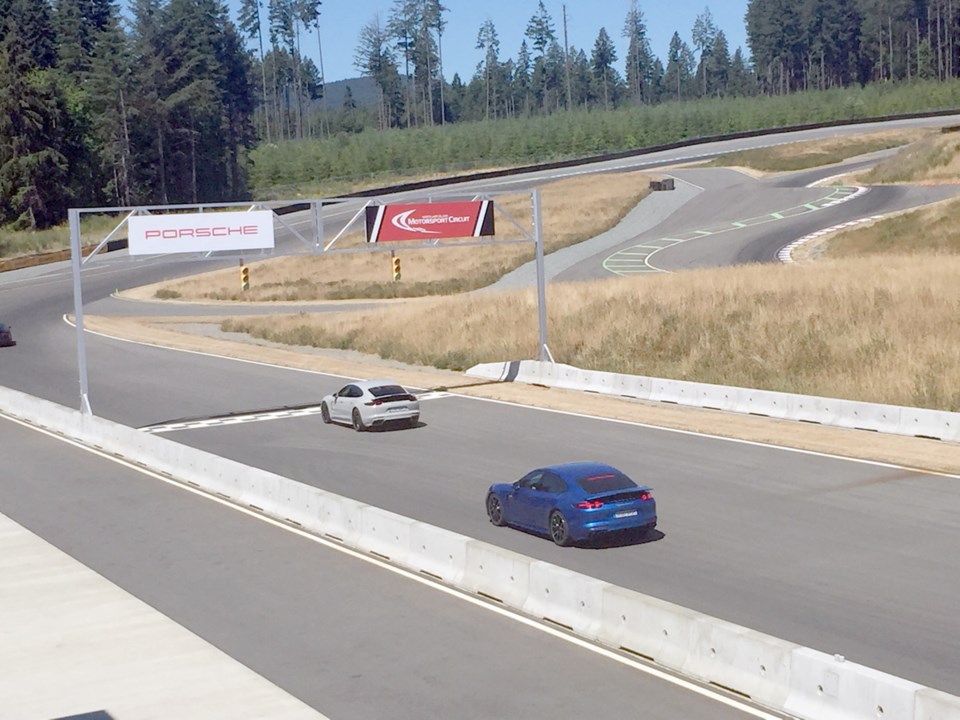UPDATE: Public hearing date now set for Dec. 9
North Cowichan council will hold another public hearing to reconsider Vancouver Island Motorsport Circuit’s rezoning application to expand from one track to two in light of a threatened $60-million lawsuit against the municipality.
Councillors voted unanimously Wednesday in favour of a public hearing, set for Dec. 9 at the Cowichan Performing Arts Centre.
They also voted unanimously to defer reconsideration of the rezoning application related to the track expansion until the public has had another chance to speak to it.
Five members of the public spoke at Wednesday's meeting against the decision to hit the reset button on the vote and public hearing. Activist Sandy McPherson, a former Highlands councillor, encouraged councillors to “hold your ground” and respect the land, saying: “don't allow yourselves to be threatened.”
On Oct. 4, North Cowichan council voted 5-2 against a second phase of the track and facilities off Highway 18, after two lengthy public hearings.
Vancouver Island Motorsport Circuit initially opened the track on 18.74 hectares in June 2016. It planned to build another phase with a second track on 42.47 hectares just north of the existing site, most of which is under the same heavy-industrial zoning as the first phase.
The company argued it could simply file for a development permit for the second phase, because the land-use and heavy-industrial zoning is essentially the same as in the first phase. That process would not have required a public hearing.
However, on the advice of the municipality, the company applied for a rezoning that would put its three parcels of land in North Cowichan — two industrial parcels and one recreational-use parcel — under one new comprehensive development zone.
The company said the expansion was a $36-million-plus investment that would create about 200 construction jobs and nearly 30 full-time jobs.
In response to community concerns, including complaints about noise, the company offered concessions, amenities and noise-mitigation measures worth about $5 million.
After receiving a letter from Cowichan Tribes Chief William Seymour criticizing the plan, council decided the expansion would run counter to the municipality’s environmental priorities and Indigenous-relations goals and voted it down. Mayor Al Siebring and Coun. Tek Manhas were the only two who voted in favour of the expansion.
On Oct. 15, the company resumed its request for a development permit for the second phase, noting that if the application was rejected, it would pursue legal remedies.
On Oct. 25, the municipality turned down the application. Planning director Rob Conway said despite a past determination that the land use was in compliance with zoning, upon “careful review I have concluded that the proposed land use is not permitted” under North Cowichan bylaws.
“Motor-vehicle testing and driver-training facility” is not listed as a permitted use in the heavy industrial zone, Conway said.
The municipality has just $20 million in insurance, and a lawsuit could leave it liable for tens of millions of dollars, possibly affecting property taxes, Siebring has warned.
The mayor asked council to reconsider the vote, following another public hearing.
The mayor is also asking Seymour for a council-to-council meeting in advance of the public hearing.
During Wednesday’s council meeting, Siebring said the decision to call a second vote was his alone and that councillors could decide only on whether a public hearing should be held first.
A lawyer for the track’s owner, GAIN Group, said in an Oct. 29 letter to North Cowichan that his client is losing patience. “Should this matter land in court, by rough calculations, my client’s damages will exceed $60 million,” Lorenzo G. Oss-Cech wrote. “In fact, damages are accruing daily due to unwarranted delays.”
The lawyer argued the municipality’s decision is “completely inconsistent with North Cowichan’s past and current positions.” The owners were assured the zoning was appropriate for the track and relied on those assurances when the first phase was built at a cost of about $37 million, Oss-Cech wrote.
“We cannot understand how North Cowichan staff can simply issue a blanket denial based on zoning non-compliance, when it is clear that the intended uses for Phase 2 are identical to the permitted uses under the [heavy industrial] zoning for Phase 1.
“There seems to be no merit to these decisions and the basis for them smack of politics and, unfortunately, bad faith.”
The company suggests denying permission for Phase 1 would put the land use for the first phase in doubt and could ultimately force it to close the entire operation.
Most of those who spoke against the staff-recommended rezoning bylaw live outside North Cowichan, whereas most supporters live in the municipality, said Oss-Cech.
Mariah Wallener, a director with the Sahtlam Neighbourhood Association, has expressed frustration that council would revisit the issue, having heard clearly and loudly from the community.
Siebring said he has received personal attacks for bringing the vote back to council, criticisms he said fail to consider that he’s obliged to give the public a chance to have their say, now that they know the legal risks. “We heard nothing from people whose property taxes might be very seriously negatively impacted by this potential lawsuit, because the threat of a lawsuit was not explicit and they didn’t know about the potential impacts.”
Siebring said the vote could go the same way it did last time.
“We don’t know what the input will be. But we need to give the public an opportunity to have their say in the context of the full scope of the information that is now available to them.”



